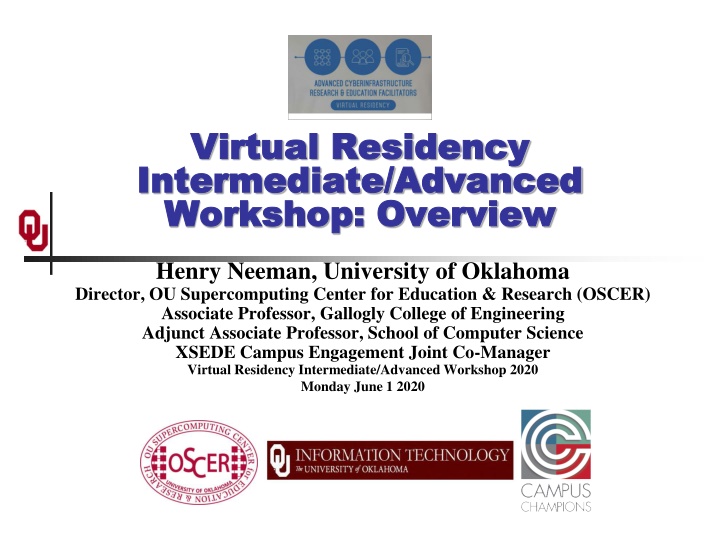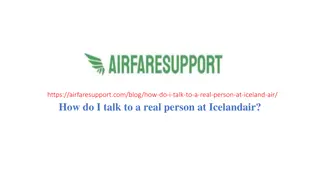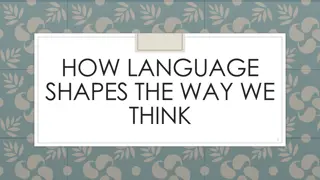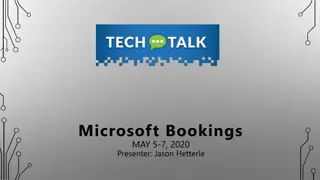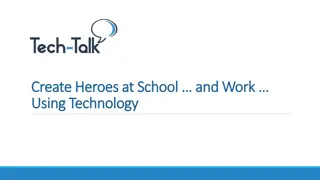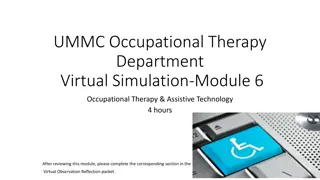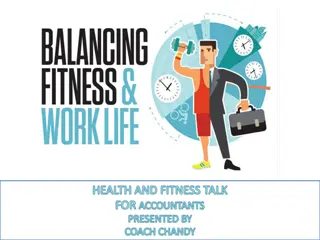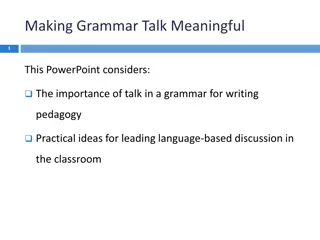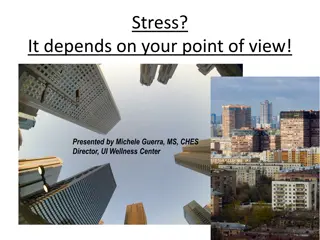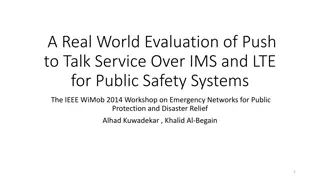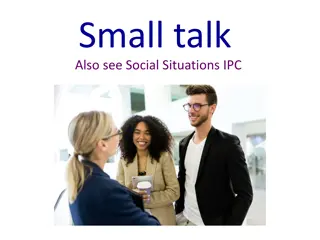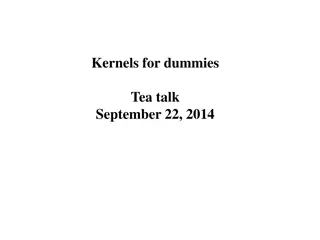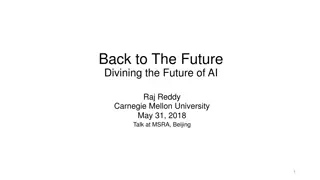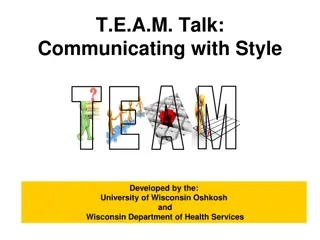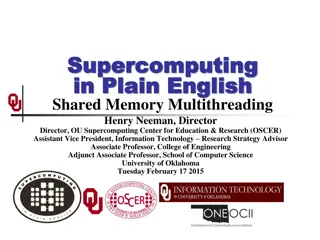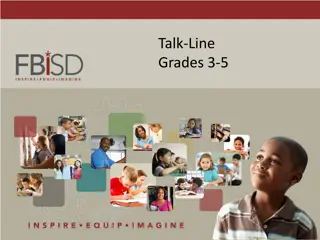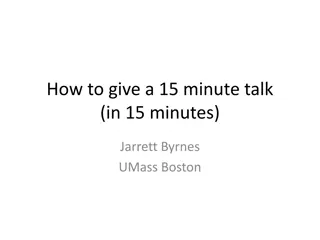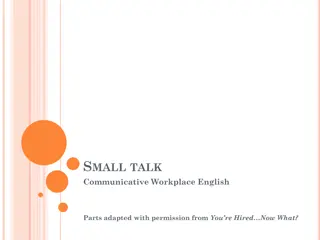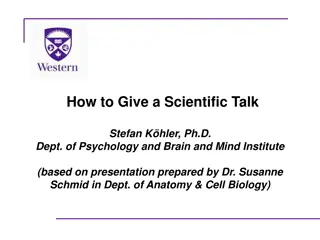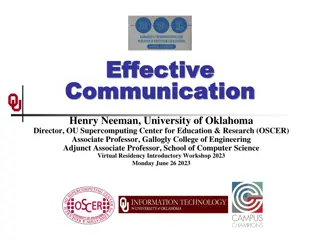Virtual Residency Workshop 2020 - Details and Instructions
The Virtual Residency Workshop 2020, hosted by Henry Neeman from the University of Oklahoma, provides an in-depth overview of intermediate to advanced topics. This workshop includes sessions on Zoom videoconferencing, materials on the workshop webpage, and instructions for participating via audio-only phone calls. Participants are encouraged to engage through Zoom for a comprehensive learning experience. For more details and resources, visit the workshop webpage or contact the provided email address. Join this virtual workshop to enhance your skills and knowledge in the field.
Download Presentation

Please find below an Image/Link to download the presentation.
The content on the website is provided AS IS for your information and personal use only. It may not be sold, licensed, or shared on other websites without obtaining consent from the author.If you encounter any issues during the download, it is possible that the publisher has removed the file from their server.
You are allowed to download the files provided on this website for personal or commercial use, subject to the condition that they are used lawfully. All files are the property of their respective owners.
The content on the website is provided AS IS for your information and personal use only. It may not be sold, licensed, or shared on other websites without obtaining consent from the author.
E N D
Presentation Transcript
Virtual Residency Virtual Residency Intermediate/Advanced Intermediate/Advanced Workshop: Overview Workshop: Overview Henry Neeman, University of Oklahoma Director, OU Supercomputing Center for Education & Research (OSCER) Associate Professor, Gallogly College of Engineering Adjunct Associate Professor, School of Computer Science XSEDE Campus Engagement Joint Co-Manager Virtual Residency Intermediate/Advanced Workshop 2020 Monday June 1 2020
Workshop Webpage & E-mail Workshop webpage: http://www.oscer.ou.edu/virtualresidency2020/ All materials will be posted here, including slides (if any), links to Google Docs for each session, and links to streaming video recordings of the sessions (afterwards). Workshop e-mail address: virtualresidency2020@gmail.com If you have questions, sending them to this e-mail address means that they ll get auto-forwarded to Henry. Virtual Residency Intmd/Adv Overview Virtual Residency Workshop 2020, Mon June 1 2020 2
Zoom Videoconferencing Zoom is compatible with Windows, MacOS, Linux, iOS and Android. If you can t use the Zoom app, you can use your phone for audio-only (but video+audio is better). Slides will be posted on the workshop webpage, but we can t guarantee that they ll always be posted before they re used. We hope to be able to post streaming video of all sessions after each session, but we don t know how long the lag will be (probably hours, hopefully by the next day: auto-captioned). Please MUTE YOURSELF except when you're talking. http://www.oscer.ou.edu/virtualresidency2020/ virtualresidency2020@gmail.com Virtual Residency Intmd/Adv Overview Virtual Residency Workshop 2020, Mon June 1 2020 3
Zoom: Video+Audio General You MUST have a Zoom account. You can get a FREE Zoom Basic account at: http://zoom.us/ In your Zoom account, please use either (a) your full name or (b) your first name and institution, for reporting to the NSF. Be sure to use Zoom version 5.x, NOT 4.x nor earlier. Windows, MacOS or Linux: In a web browser, go to the Zoom URL we sent you via e-mail. That will get you a download of the Zoom app for your OS. Android or iOS: Go to your app store and download the FREE Zoom app. Run the Zoom app and go to the meeting ID number in the e-mail. Please MUTE YOURSELF except when you're talking. http://www.oscer.ou.edu/virtualresidency2020/ virtualresidency2020@gmail.com Virtual Residency Intmd/Adv Overview Virtual Residency Workshop 2020, Mon June 1 2020 4
Phone: Audio Only, USA For audio only via phone, from inside the USA: On any USA phone, dial: 646-558-8656 (USA toll) OR 408-638-0968 (USA toll) Use the meeting ID and numeric password in the e-mail. Please e-mail hneeman@ou.edu with your name, institution and phone number, so that we can properly track and report how many people attended from each institution. NOTE: NO TOLL FREE telephone audio-only option for remote attendees inside or outside the USA. Please MUTE YOURSELF except when you're talking. http://www.oscer.ou.edu/virtualresidency2020/ virtualresidency2020@gmail.com Virtual Residency Intmd/Adv Overview Virtual Residency Workshop 2020, Mon June 1 2020 5
Phone: Audio Only, Non-USA For audio only via phone, from outside the USA: Open a web browser and go to: https://zoom.us/zoomconference?m=GBPzosolPR18D5S7Ig55m6KM95W8UxEF Find your country and call that TOLL number (NO toll free). Use the meeting ID and numeric password in the e-mail. Please e-mail hneeman@ou.edu with your name, institution and phone number, so that we can properly track and report how many people attended from each institution. NOTE: NO TOLL FREE telephone audio-only option for remote attendees inside or outside the USA. Please MUTE YOURSELF except when you're talking. http://www.oscer.ou.edu/virtualresidency2020/ virtualresidency2020@gmail.com Virtual Residency Intmd/Adv Overview Virtual Residency Workshop 2020, Mon June 1 2020 6
Zoom: Camera Off, Mic Muted If you re on Zoom, please keep your CAMERA OFF except when asking a question: Some of our attendees have limited bandwidth for Zoom, so having extra movement on the screen may slow down or even crash their Zoom connection. If you re on Zoom or on the phone, please keep your MICROPHONE MUTED except when asking a question. Remember, there are lots of you (hundreds total, typically more than a hundred at a time). If you forget to mute your camera and/or microphone, we will mute you. If you keep turning those back on unnecessarily, we will kick you off. Virtual Residency Intmd/Adv Overview Virtual Residency Workshop 2020, Mon June 1 2020 7
Outline This is an experiment! Research Computing Facilitators National Science Foundation s Campus Cyberinfrastructure Programs You re Next http://www.oscer.ou.edu/virtualresidency2020/ virtualresidency2020@gmail.com Virtual Residency Intmd/Adv Overview Virtual Residency Workshop 2020, Mon June 1 2020 8
This is an Experiment! More than half of this week is exciting and new. Those of you who are new are only the 6th cohort of what has become a national program. This means that you re helping us to pioneer a new way of developing the next generation Cyberinfrastructure (CI) workforce. http://www.oscer.ou.edu/virtualresidency2020/ virtualresidency2020@gmail.com Virtual Residency Intmd/Adv Overview Virtual Residency Workshop 2020, Mon June 1 2020 9
Only You can make the Virtual Residency a success. Ask questions the only dumb questions are the ones you don t ask. Volunteer your ideas and experiences. Ultimately, it s you who will have to be in charge, not us. http://www.oscer.ou.edu/virtualresidency2020/ virtualresidency2020@gmail.com Virtual Residency Intmd/Adv Overview Virtual Residency Workshop 2020, Mon June 1 2020 10
This Is So New, We Dont Know How to Teach It For the Introductory workshops (2015-17, 2019), we were able to find speakers for most of the topics we covered. For this combined Intermediate/Advanced workshop, very few of the topics are issues that any of us know enough about to be able to teach to others at the Intermediate or Advanced level. So, most of the Intermediate and Advanced sessions are panels we ll learn from each other! http://www.oscer.ou.edu/virtualresidency2020/ virtualresidency2020@gmail.com Virtual Residency Intmd/Adv Overview Virtual Residency Workshop 2020, Mon June 1 2020 11
Research Computing Facilitators
What is a Research Computing Facilitator? Advanced Cyberinfrastructure Research & Education Facilitator (ACI-REF term coined by Miron Livny) Work with users researchers and educators to help them improve their research and/or education productivity and aspirations via advanced Cyberinfrastructure (CI). Typically, one or a few CI Facilitators have responsibility for an entire institution, or even multiple institutions. At some institutions, CI Facilitation is part time; at others, it s full time. Some Research Computing Facilitators are: faculty or former faculty; postdocs or former postdocs; research staff or former research staff; IT professionals, including from Enterprise IT; graduate or undergraduate students. Virtual Residency Intmd/Adv Overview Virtual Residency Workshop 2020, Mon June 1 2020 13
A Little Background In 2013, a team of 13 institutions led by Clemson U submitted an 8-figure proposal on this issue, to provide multiple ACI-REFs at each institution over a 4 year period. http://www.aciref.org/wp-content/uploads/2014/04/map.png The proposal also included funding for advanced networking. Virtual Residency Intmd/Adv Overview Virtual Residency Workshop 2020, Mon June 1 2020 14
OUs Piece OU s piece included some extra components: A Virtual Residency to teach how to be a Research Computing Facilitator THIS! A component about EPSCoR jurisdictions, shared with HI, SC and UT (note that UT has now graduated from EPSCoR): EPSCoR: Established (formerly Experimental) Program for the Stimulation of Competitive Research: a federal program to promote and increase STEM research in states that get less than 0.75% of federal research funding. NSF, Dept of Energy, Dept of Defense, NASA NIH (known as INBRE) Virtual Residency Intmd/Adv Overview Virtual Residency Workshop 2020, Mon June 1 2020 15
Ah, if only . Unfortunately, the NSF wasn t able to fully fund that proposal. The team ended up reducing down to 6 institutions for 2 years, and no advanced networking. NOTin Phase 1: Arizona State U Emory U Ohio Supercomputer Center Stanford U Sunshine State Education & Research Computing Alliance (SSERCA) U Oklahoma U Washington Phase 1: Clemson U Harvard U U Hawai i U Southern California U Utah U Wisconsin Madison Virtual Residency Intmd/Adv Overview Virtual Residency Workshop 2020, Mon June 1 2020 16
National Science Foundation s Campus Cyberinfrastructure Programs
And then In 2012-13, the NSF had a program called Campus Cyberinfrastructure - Networking Infrastructure & Engineering (CC-NIE). Two subprograms: One for deploying networking equipment, one for innovative networking research. OU, OSU, Oklahoma Innovation Institute, Langston U, OneNet: OneOklahoma Friction Free Network In 2014, that was followed by Campus Cyberinfrastructure - Infrastructure, Innovation & Engineering (CC*IIE). Several new subprograms, including Campus CI Engineer. Since then, the same program has had various names, but always starting with Campus Cyberinfrastructure (CC*). Virtual Residency Intmd/Adv Overview Virtual Residency Workshop 2020, Mon June 1 2020 18
So In 2014, OU submitted a Campus CI Engineer proposal: A Model for Advanced Cyberinfrastructure Research and Education Facilitators $400K Highlighted the relationship between OU and the ACI-REF project. We put Clemson s Phase 1 PI on our External Advisory Committee. OU was the only institution that was all of: Former ACI-REF Phase 1 (so already involved) EPSCoR (and was to have co-led the ACI-REF EPSCoR thrust) CC* equipment awardee (so needed a Campus CI Engineer already) Virtual Residency Intmd/Adv Overview Virtual Residency Workshop 2020, Mon June 1 2020 19
Objectives Data-Intensive Research Facilitation: Via Software Defined Networking (SDN) across OFFN, facilitate end-to-end management, by researchers, of high bandwidth/high performance data flows through a distributed hierarchy of open standards tools, providing researchers with a new layer of transparency into network transport at OU, among OneOCII institutions, and with ACI-REF members. Oklahoma ACI-REF project: Lead and facilitate adoption of the ACI-REF approach across Oklahoma, leveraging extant and emerging capabilities within OneOCII. National training regime: Provide a virtual residency program for Campus CI Engineers and other ACI-REFs, open to not only CC*IIE awardees and ACI-REF members but any institution that needs. Research Experiences for Undergraduates (REU) Sites/Supplements: Foster undergraduate research at OU via a culture of integrating REU sites and supplements into Science, Technology, Engineering & Mathematics (STEM) research, including by all research themes on this proposed CC*IIE project. Virtual Residency Intmd/Adv Overview Virtual Residency Workshop 2020, Mon June 1 2020 20
Success! Reviewer comments This energetic, detailed and ambitious proposal from the University of Oklahoma deserves the highest priority for support. There are no major weaknesses in the proposal and many strengths. The broader impacts are nicely defined in terms of the idea of a residency program . A residency program and enhancement of undergraduate research are strong enhancements to the proposal. This is one of the better proposals regarding additional outreach via the budgeted virtual residency program. [Emphasis added.] Virtual Residency Intmd/Adv Overview Virtual Residency Workshop 2020, Mon June 1 2020 21
Even More Success! From a review from the Clemson-led Research Coordination Network grant that created the Campus Research Computing Consortium (CaRCC), regarding broader impacts: The ACI-REF virtual residency held at OU Supercomputing Center may be notable (the web site s description of the workshop looked outstanding) assuming it was available to a broader community and not just the [Phase 1] awardees. 2015: 49 of 50 participants (98%), from 37 of 38 institutions (97%), were not just the [Phase 1] awardees. 2016: 90 of 99 participants (91%), from 60 of 66 institutions (91%), were not just the [Phase 1] awardees. 2017: 186 of 196 participants (95%), from 128 of 134 institutions (96%), were not just the [Phase 1] awardees. 2018: 210 of 216 participants (97%), from 144 of 147 institutions (98%), were not just the [Phase 1] awardees. 2019: 249 of 254 participants (98%), from 161 of 164 institutions (98%), were not just the [Phase 1] awardees. Virtual Residency Intmd/Adv Overview Virtual Residency Workshop 2020, Mon June 1 2020 22
Enterprise IT Enterprise IT vs vs Research Computing: Research Computing: Why Enterprise IT Why Enterprise IT Approaches to Approaches to Training Won t Work Training Won t Work
Enterprise IT vs Research Computing Enterprise IT: HARDENED Secure Established technology Best practices 5 nines: 99.999% uptime = 5 minutes of downtime per year Research Computing: SQUISHY Fast and flexible (turn on a dime) Cutting edge technology (= broken) In some cases, no such thing as best practices 1 nines: 95% uptime = 18 days of downtime per year This is the NSF s standard, from NSF solicitation 17-558 (Frontera): [$60M NSF-funded] production resources should be unavailable as a result of scheduled and unscheduled maintenance no more than 5% of the time. Virtual Residency Intmd/Adv Overview Virtual Residency Workshop 2020, Mon June 1 2020 24
Enterprise IT Example On Aug 8 2016, Delta Air Lines experienced a power outage in their Atlanta data center that lasted 5 hours. Cost: $150M ($1M for every 2 minutes of downtime) https://money.cnn.com/2016/09/07/technology/delta-computer-outage-cost/ Virtual Residency Intmd/Adv Overview Virtual Residency Workshop 2020, Mon June 1 2020 25
Enterprise vs Research: Incentives Suppose payday is tomorrow, and the payroll system goes down tonight. On payday, what happens to the Enterprise IT people who are accountable for the outage? Therefore, what must Enterprise IT people do to stay in business? Suppose Research Computing isn t on the cutting edge, and so proposals from the institution are less competitive. Eventually, what will happen to the Research Computing team? Therefore, what must Research Computing people do to stay in business? Virtual Residency Intmd/Adv Overview Virtual Residency Workshop 2020, Mon June 1 2020 26
Enterprise vs Research: How to Resolve? Research Computing can afford to make mistakes: A system that s mostly up but crashes occasionally is fine. 1 24-hour day of HPC downtime = 10-100 lost grad student days 1 grad student = ~$59K/yr fully loaded with fringe+tuition+Indirect => 100 grad student days = ~$16K productivity loss => ~$300-$1600 productivity loss per research group Cost of 5 Nines vs 1 Nines: 5-10x, but budgets are fixed so the actual cost is cutting computing-intensive/data-intensive research productivity by 5-10x (i.e., lose 80-90% of productivity). Therefore: Let the machine go down from time to time, as a tradeoff for having more (but less resilient) resources, to maximize research productivity per year, at the cost of occasional lost days. Virtual Residency Intmd/Adv Overview Virtual Residency Workshop 2020, Mon June 1 2020 27
Research is the Enterprise Testbed Research Computing has only limited best practices. But, technologies currently being adopted by Research Computing (e.g., Software Defined Networking) are likely to become enterprise requirements in a few to several years. So, let Enterprise IT watch Research Computing make mistakes, and use those observations to develop best practices for Enterprise IT. Virtual Residency Intmd/Adv Overview Virtual Residency Workshop 2020, Mon June 1 2020 28
Enterprise IT Training Wont Work Enterprise IT: Millions of professionals 1970: 450K (0.6% of US civilian workforce) 2014: 4.6M (2.9%) Degree programs (AS, BS, MS, PhD, certificates) Certifications (e.g., CISSP, RHCE, MCSE, etc) Enormous resources devoted to constantly updating skills NOTE: This DOESN T take into account the explosion of data science degree programs in the late 2010s. Research Computing: Thousands of professionals No degree programs No certifications Minimal resources Therefore, informal education is our best bet! https://www.census.gov/content/dam/Census/library/publications/2016/acs/acs-35.pdf Virtual Residency Intmd/Adv Overview Virtual Residency Workshop 2020, Mon June 1 2020 29
Growth in CI Facilitators Participating Individuals (top) and Institutions (bottom) in Campus Champions, the Virtual Residency and the CaRCC Researcher-Facing group, 2008-19. Virtual Residency Intmd/Adv Overview Virtual Residency Workshop 2020, Mon June 1 2020 30
Current CI Facilitators Per a survey we did in late 2019/early 2020, there are currently ~1200 CI Facilitators in service at R1s and R2s, which is expected to roughly double in the coming 5 years. Virtual Residency Intmd/Adv Overview Virtual Residency Workshop 2020, Mon June 1 2020 31
Virtual Residency: What? We teach pre-service and in-service Research Computing Facilitators how to do (or do better) Research Computing Facilitation. But then we have a hidden secret agenda . Virtual Residency Intmd/Adv Overview Virtual Residency Workshop 2020, Mon June 1 2020 33
Virtual Residency: How? Annual weeklong summer workshop (since 2015) U California System has run its own targeted workshop based on our introductory workshop, in spring 2017, 2018 and 2019. Virtual Residency workshop planning calls Annual meeting at the SC supercomputing conference 2017-18, 18-19, 19-20: Grant Proposal Writing Apprenticeship 2018-19, 19-20: Paper Writing Apprenticeship (PEARC 19 paper published, PEARC 20 paper to appear) Before the Virtual Residency, no one had ever been dumb enough to try to teach this stuff. Virtual Residency Intmd/Adv Overview Virtual Residency Workshop 2020, Mon June 1 2020 34
Virtual Residency: Why? CI Facilitators have strong experience within their discipline (often non-CS). Most CI Facilitators (and other CI pros) haven t been faculty. Sometimes little or no research experience (especially for IT staff who have an enterprise IT background). Even if strong research background, typically little or no experience with research outside their own discipline. When we started the Virtual Residency in 2015, there were no local, regional or national programs to teach people how to be a CI Facilitator. In the olden days, you could take your time learning how to do this but not anymore . Virtual Residency Intmd/Adv Overview Virtual Residency Workshop 2020, Mon June 1 2020 35
Virtual Residency: Who? 2015-present: We ve already served 710 people from 327 institutions in all 50 US states and 3 US territories, plus 8 other countries on 5 continents, including: 54 (17%) Minority Serving Institutions; 87 (27%) non-PhD-granting institutions; 96 institutions (29%) in 27 of 28 (96%) EPSCoR jurisdictions; 233 institutions (71%) are Campus Champion institutions (72% of Campus Champion institutions). This is for ALL Virtual Residency activities, including: workshops (including mini-workshops by/for U California); conference calls; the Grant Proposal Writing Apprenticeship; the Paper Writing Apprenticeship. Virtual Residency Intmd/Adv Overview Virtual Residency Workshop 2020, Mon June 1 2020 36
Virtual Residency: Whos Here? We can t yet say who s attending this week s workshop, but we can say who s preregistered: 582 preregistrants (2019: 334; 2018: 312; 2017: 257); 289 preregistered institutions, from EVERY US state, 3 US territories and 12 other countries on 6 continents, including: 42 Minority Serving Institutions (15% of this year s institutions), 67 non-PhD-granting institutions (23%), 76 institutions (26%) in 27 of 28 (96%) EPSCoR jurisdictions, 193 Campus Champion institutions (67% of workshop institutions, 59% of Campus Champion institutions). Virtual Residency Intmd/Adv Overview Virtual Residency Workshop 2020, Mon June 1 2020 37
Why is Helping Researchers Hard? Ubiquity: Within any discipline, a greater proportion of researchers do computing-intensive and/or data-intensive research now than ever before. Applicability: More disciplines do computing-intensive and/or data-intensive research now than ever before. System Complexity: The storage hierarchy is getting deeper (flash, non-volatile RAM etc), and parallelism is getting more hybrid (GPUs etc). Conceptual Distance: The mental gap from handheld computing to command line/Linux/batch/remote/shared. But we still only have one hour to teach them how to use CI before they lose interest! Virtual Residency Intmd/Adv Overview Virtual Residency Workshop 2020, Mon June 1 2020 38
More Institutions Have On-Premise CI The fraction of national universities that have on-premise research computing resources (US News rankings): 130 of 131 R1s (Carnegie Classification Very High Research Activity); 84 of 135 R2s (High Research Activity); 49 of the top 50 institutions; 95 of the top 100; 132 of the top 150 (88%); 159 of the top 200 (80%). Virtual Residency Intmd/Adv Overview Virtual Residency Workshop 2020, Mon June 1 2020 39
Most Institutions Have Virtual Residents The fraction of US News national universities that have participated in, or are registered to participate in, the Virtual Residency (percentages due to ties in the last position): ALL the top 10 institutions; 23 of the top 25 (88%); 46 of the top 50 (87%); 66 of the top 75 (87%); 84 of the top 100 (82%); 117 of the top 150 (77%); 138 of the top 200 (69%); 157 of the top 250 (62%). https://www.usnews.com/best-colleges/rankings/national-universities Virtual Residency Intmd/Adv Overview Virtual Residency Workshop 2020, Mon June 1 2020 40
Does the Virtual Residency Work? We assume that y all are plenty busy with other things, so you d only bother to show up if this were worthwhile. As of last week: 251 of 327 Virtual Residency institutions (77%) had participated in multiple Virtual Residency activities; 224 of 327 Virtual Residency institutions (69%) had participated in multiple types of Virtual Residency activities. If we take into account preregistrations: 280 of 327 Virtual Residency institutions (86%) had participated in or signed up for multiple Virtual Residency activities; 235 of 327 Virtual Residency institutions (72%) had participated in or signed up for multiple types of Virtual Residency activities. Virtual Residency Intmd/Adv Overview Virtual Residency Workshop 2020, Mon June 1 2020 41
Virtual Residency Evaluation This year, for the first time, we ll be doing an external evaluation of the Virtual Residency workshop. Georgia Tech Institutional Review Board protocol # H16227, approved 6/30/2016, approved for use at OU by OU s IRB 5/13/2020. The evaluation will be conducted by the same team that does the evaluation for the XSEDE program, led by Lizanne DeStefano and Lorna Rivera. You ll be contacted about participating. If you re in the EU, we can t have you participate, because of GPDR complexities. You AREN T required to participate, and you WON T face any negative consequences if you decline. Virtual Residency Intmd/Adv Overview Virtual Residency Workshop 2020, Mon June 1 2020 42
The CI Professional Ecosystem Campus Champions Campus Research Computing Consortium (CaRCC) Coalition for Academic Scientific Computation CyberAmbassadors Linux Clusters Institute SIGHPC Education Chapter The Carpentries Science Gateways Community Institute UK Research Software Engineer Association US Research Software Engineer Association JOIN THESE! Ask us for contact info! US Research Software Sustainability Institute Virtual Residency Intmd/Adv Overview Virtual Residency Workshop 2020, Mon June 1 2020 43
2020 Intmd/Adv Workshop Agenda Mon June 1 2020 Tue June 2 2010 Adv: The CI Funding Landscape: Funding Agency Perspectives* Intmd: Assessing and Anticipating Researcher Needs Adv: Perspectives about CI from CIOs & VPRs Intmd/Adv: Deciding Which Technologies to Adopt, and When Virtual Residency Intermediate/Advanced Workshop 2020 Overview Intmd: Facilitating AI/Machine Learning/Deep Learning Adv: Things I Wish I'd Known Before I Became a CI Leader* Intmd: Research Data Management for Big Data * CI Leadership Academy * CI Leadership Academy Virtual Residency Intmd/Adv Overview Virtual Residency Workshop 2020, Mon June 1 2020 44
2020 Intmd/Adv Workshop Agenda Wed June 3 2020 Adv: Strategic Thinking & Visioning Adv: Working Effectively with Vendors* Adv: Teams of CI Professionals: Recruitment & Retention, Management, Team-building, and Motivation Adv: Building Community Thu June 4 2020 Intmd/Adv: CyberAmbassadors: Leading the Change: Equity and Inclusion; Leading with Principles: Ethics Intmd: Explaining Complex Technical Topics to Researchers Intmd: Mapping Research Requirements to Software Tools Intmd: Research Computing Facilitation for Non-Traditional Disciplines * CI Leadership Academy Virtual Residency Intmd/Adv Overview Virtual Residency Workshop 2020, Mon June 1 2020 45
2020 Intmd/Adv Workshop Agenda Fri June 5 2020 Adv: Sustainability Intmd: Facilitating Cloud Computing Adv: Marketing, Communication, Demonstrating Impact/Value Stories from the Trenches Virtual Residency Intmd/Adv Overview Virtual Residency Workshop 2020, Mon June 1 2020 46
Agenda You can get a copy of the agenda in your web browser: http://www.oscer.ou.edu/virtualresidency2020.php#agenda Everything on it is subject to change without notice: We may drop some of the sessions. We may add sessions that we think are needed. You re going to help us learn how to help you learn. Virtual Residency Intmd/Adv Overview Virtual Residency Workshop 2020, Mon June 1 2020 47
96 Speakers from 68 Institutions #1 1. 2. 3. 4. 5. 6. 7. 8. 9. 10. Sharon Broude Geva, U Michigan Ann Arbor 11. Dana Brunson, Internet2 12. Cyd Burrows, U California San Diego 13. Sarvani Chadalapaka, U California Merced 14. Wallace Chase, Research and Education Advanced Network New Zealand (REANNZ) 15. Shafaq Chaudhry, U Central Florida 16. Dave Chin, Drexel U 17. Damian Clarke, Alabama A&M U Hussein Al-Azzawi, U New Mexico Izzat Alsmadi, Texas A&M U San Antonio Rachana Ananthakrishnan, U Chicago/Globus Jonathan Anderson, U Colorado Boulder Gladys Andino, U Virginia Asher Antao, Clemson U Dustin Atkins, Clemson U Kevin Brandt, South Dakota State U Paul Brenner, U Notre Dame 18. Pat Clemins, U Vermont 19. Annette Colbert-Black, Visage Productions Inc 20. Dirk Colbry, Michigan State U 21. Galen Collier, Rutgers U 22. Melissa Cragin, U California San Diego 23. Cassian D'Cunha, Florida International U 24. James Deaton, Great Plains Network 25. Shawn Doughty, Tufts U 26. Randy Downer, Colby College 27. Rick Downs, U Virginia 28. Rudi Eigenmann, U Delaware 29. Frank Feagans, U Texas Dallas 30. Jim Ferguson, U Oklahoma 31. Jacob Fosso Tande, U North Carolina Greensboro 32. Richard Galbraith, U Vermont 33. Andrew Gallo, George Washington U 34. Sandra Gesing, U Notre Dame Virtual Residency Intmd/Adv Overview Virtual Residency Workshop 2020, Mon June 1 2020 48
96 Speakers from 68 Institutions #2 35. Josh Gyllinsky, U Rhode Island 36. Scott Hampton, U Notre Dame 37. Yvonne Harris, California State U Sacramento 38. Mark Hart, U Illinois Urbana-Champaign 39. Laura Herriott, U Illinois Urbana-Champaign 40. Joe Johnson, U Wisconsin Madison 41. Alper Kinaci, Northwestern U 42. Gretta Kellogg, Pennsylvania State U 43. Fahad Khan, U Central Florida 44. Christine Kirkpatrick, U California San Diego 45. Josh Kissee, Texas A&M U College Station 46. Anna Klimaszewski-Patterson, California State U Sacramento 47. Jim Kurose, U Massachusetts Amherst 48. Amy Latessa, U Cincinnati 49. Scott Lathrop, Shodor 50. Sam Levis, SLevis Consulting LLC 51. Evan Linde, Oklahoma State U 52. Prasad Maddumage, Florida State U 53. Tobin Magle, U Wisconsin Madison 54. Diego Men ndez, Pennsylvania State U 55. Tim Middelkoop, U Missouri Columbia 56. Fanny Milanova, U Arkansas Little Rock 57. Peter Mills, Washington State U 58. Claire Mizumoto, U California San Diego 59. Mahmood Mohammadi Shad, Harvard U 60. Kyle Monahan, Tufts U 61. William Stonewall Monroe, U Alabama Birmingham 62. Henry Neeman, U Oklahoma 63. Amy Neeser, U California Berkeley 64. Kinnothan Nelson, U Michigan Ann Arbor 65. Fitz Nembhard, Florida Institute of Technology 66. Mike Norman, U California San Diego 67. Ed Pearson, Alabama A&M U 68. Anchalee Phataralaoha, U Florida Virtual Residency Intmd/Adv Overview Virtual Residency Workshop 2020, Mon June 1 2020 49
96 Speakers from 68 Institutions #3 69. Sai Pinnepalli, Louisiana State U 70. Todd Price, Pennsylvania State U 71. Irene Qualters, Los Alamos National Laboratory 72. Chris Reidy, Arizona State U 73. Zak Sakoglu, U Houston Clear Lake 74. Barry Schneider, National Institute for Standards & Technology 75. Anita Schwartz, U Delaware 76. Horst Severini, U Oklahoma 77. Asya Shklyar, Pomona College 78. Ric Simmons, Louisiana State U 79. Jason Simms, Lafayette College 80. Justin Sipher, Justin Sipher Consulting LLC 81. Preston Smith, Purdue U 82. Dan Stanzione, U Texas Austin 83. Sarah Stevens, U Wisconsin Madison 84. Dena Strong, U Illinois Urbana-Champaign 85. Annamaria Szakonyi, Saint Louis U 86. Mohammed Tanash, Kansas State U 87. Kelli Trosvig, Internet2 88. Scott Turnbull, U Vermont 89. Scott Valcourt, U New Hampshire 90. Dan Voss, Beaumont Health System 91. Brian Voss, Brian D. Voss and Associates LLC 92. Jason Wells, Bentley U 93. James Wix, Research and Education Advanced Network New Zealand (REANNZ) 94. Scott Yockel, Harvard U 95. Jeff Zais, New Zealand eScience Infrastructure 96. Joel Zysman, U Miami Virtual Residency Intmd/Adv Overview Virtual Residency Workshop 2020, Mon June 1 2020 50
